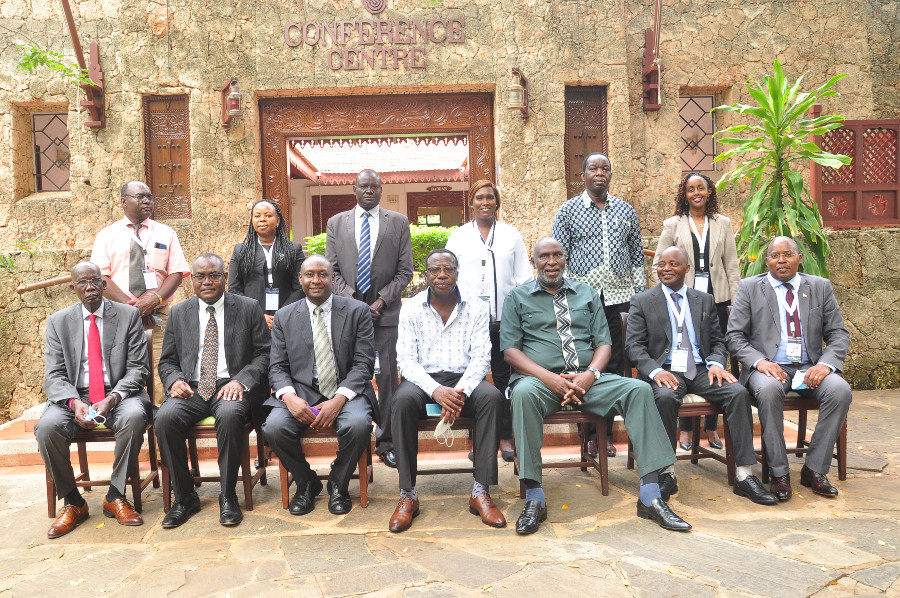
National Judicial Training Institutes in EAC Partner States urged to prioritise their training needs when engaging Development Partners
East African Community Headquarters, Arusha, Tanzania, 15th December, 2021: The East African Judicial Education Committee (EAJEC) has urged National Judicial Training Institutes in EAC Partner States to prioritise their training needs when seeking support from Development Partners.
EAJEC observed that National Judicial Training Institutes know their training needs and should be allowed to implement them to fill the existing human resource gaps in national judiciaries.
EAJEC emphasised the need for the Judicial Training Institutes to set up a standing fund that can be utilized where donor funds fall short.
EAJEC further recommended that the East African Community (EAC) Secretariat engages development partners to support the training of Judges and Judicial Officers from EAC Partner States.
The EAJEC that met in Mombasa, Kenya noted that support by development partners was critical because National Judicial Training Institutes continues to experience financial limitations that have hindered their activities.
The one-day meeting was attended by the Heads of Judicial Training Institutes, Judges of the Courts of Judicature of the Partner States and staff from the EAC Secretariat.
The EAJEC meeting that was chaired by Justice Smokin Wanjala of the Supreme Court of Kenya and Director of the Kenya Judiciary Academy, further observed that it was important for Partner States to prioritize activities of the National Judicial Training Institutes.
The meeting noted that the budget of the East African Court of Justice (EACJ), which is drawn from Partner States’ contributions, is currently insufficient for the operations of the regional court.
The Judges and Judicial Officers hailed the National Judicial Training Institutes for adopting the use of technology to conduct their trainings in the wake of the Covid-19 pandemic, adding that National Courts and the EACJ have similarly adopted the use of technology to conduct court hearings.
Justice Wanjala noted that in accordance with Articles 6 and 7 of the Treaty for the Establishment of the EAC (EAC Treaty), one of the key Principles on which the Community is anchored is Respect for the Rule of Law.
“To this end, the EAC Partner States have committed to ensure the enactment of just laws and just interpretation and application of those laws,” said Justice Wanjala.
“Consequently, the courts and the justice systems are an integral part of the Community’s regional accountability systems. EACJ, being the judicial body of the Community, continually strives to ensure adherence to the rule of law through its interpretation and application of the Principles of the EAC Treaty,” he added.
Justice Wanjala further said that in accordance with Article 126 of the EAC Treaty, national judiciaries were expected to cooperate with a view to harmonizing the region’s judicial and legal systems.
“In so doing, the courts play a crucial role in the promotion of respect for the rule of law, and the deepening of regional cooperation in the administration of justice. This calls for the continuous training of, consultations, and dialogue between the region’s judges, magistrates and other judicial officers,” he said.
Also present at the meeting were the Counsel to the Community, Dr. Anthony Kafumbe, and Members of the EAJEC, namely: Hon. Justice (Dr.) Benjamin Baak Deng; Hon. Justice Henry Adonyo; Hon. Justice Dr. Gerald Ndika; Mr. Edouard Minani, and; Dr. Didas Kayihura. Others were Mr. Justice Charles Nyachae, Judge, EACJ, and; His Worship, Hon. Yufnalis Okubo, the Registrar of EACJ.
For more information, please contact:
Simon Peter Owaka
Senior Public Relations Officer
Corporate Communications and Public Affairs Department
EAC Secretariat
Arusha, Tanzania
Tel: +255 768 552087
Email: sowaka [at] eachq.org
About the East African Community Secretariat:
The East African Community (EAC) is a regional intergovernmental organisation of six Partner States, comprising Burundi, Kenya, Rwanda, South Sudan, Tanzania and Uganda, with its headquarters in Arusha, Tanzania.
The EAC Secretariat is ISO 9001: 2015 Certified
